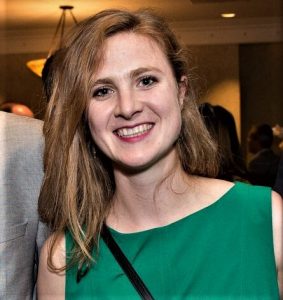Rebecca Liebschutz – Chief of Staff, Binti

Rebecca is passionate about using social entrepreneurship to solve social and environmental problems. After college, she spent 4 years working in Uganda for SPOUTS of Water, which manufactured and sold household ceramic water filters, providing access to clean drinking water for rural communities, schools, and health centers. Upon moving back to the US, this passion brought her to working at Binti, which she currently serves as Chief of Staff. Rebecca earned a degree in Environmental Studies and Philosophy, Political Science, and Economics (PPE) from the University of Michigan and also served on the University’s Planet Blue Student Innovation Fund, which provided student grants for tangible sustainability projects on campus. After growing up in upstate New York and then living in Michigan and Uganda, she now calls Oakland (CA) home!
What is the educational and career path that led to your current career?
In Uganda, I worked on providing a market-driven solution that had measurable, positive outcomes not only for health but for offsetting carbon (by filtering instead of burning charcoal/wood to boil). It was there that I learned firsthand how intertwined social, economic and environmental factors are. My experience also showed me how important it is to move towards sustainability with a socio-economic equity as the focus. At Binti, our mission is to provide equality of opportunity and ensure that every child has a fair chance at life, by creating modern, mobile-friendly software specifically designed to support child welfare agencies in streamlining their work and promoting quality practice. Binti’s work to date has helped these agencies license more foster parents and help more kids thrive in safe and loving homes. Regardless of the circumstances that people are born into, the more children that have the chance to thrive and make a meaningful impact in society, the more we can all move towards a more just and sustainable planet.
How did you become interested in environmental work?
Growing up in the turn of the 21st century, environmental issues have really become the “issues of our time”. I do not recall a specific moment, but as a child it was quite clear to me that this was an ever-growing challenge that our generation would need to address. When I entered college, I could not think of a more important and impactful field than Environmental Studies. During this time, I also studied abroad in India and conducted research on how organic certification impacts small-scale farmers, and then shortly after moved to Uganda. Through both of these experiences, I saw how important it was that the environmental movement requires us to focus also on sustainable development, and helping build systems for growth in sustainable ways, which will have massive impacts on the planet in the future.
In the past few years, we have seen the escalation of climate change and how it is impacting people’s everyday lives – fires, floods, droughts, extinction of species- the list goes on and on. It is vital for everyone to be part of the solution, and I want to play my part.
What environmental issues are of most concern to you?
On a global scale, patriarchal systems and lack of women’s access to education have detrimental impacts on the planet. As discussed in Project Drawdown, providing education to girls and women globally has the potential to reduce global CO2 emissions by 59.6 gigatons! A woman’s fight for education and equality can make a huge impact. There is evidence to show that when women succeed, we all succeed- this is true socially and economically, and environmentally. For those of us that are privileged with greater access to opportunities, it is important to ensure that other women have the same.
Connect with Rebecca on LinkedIn
Follow her on Instagram
